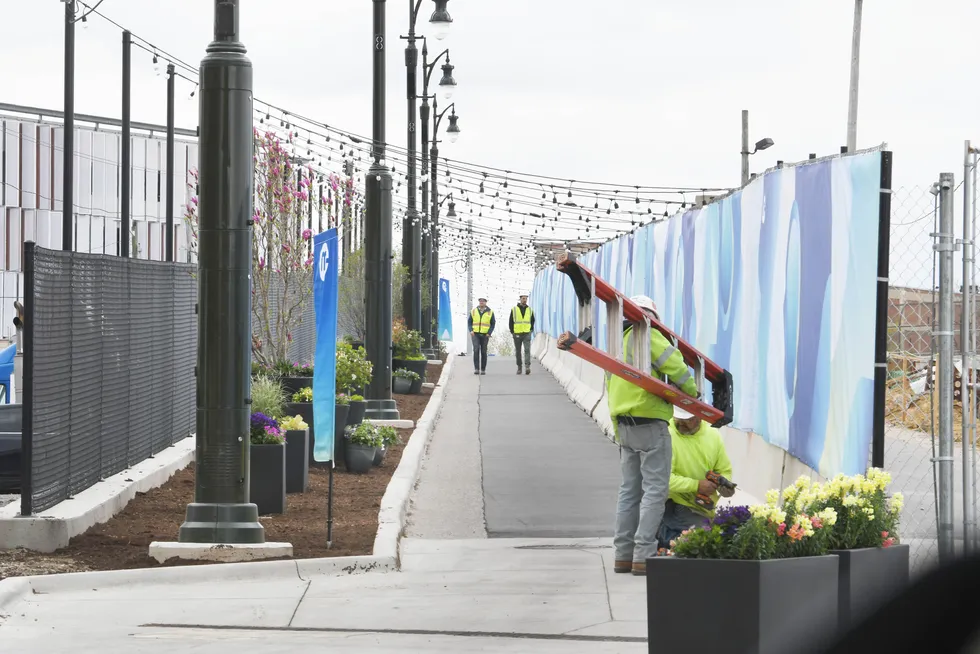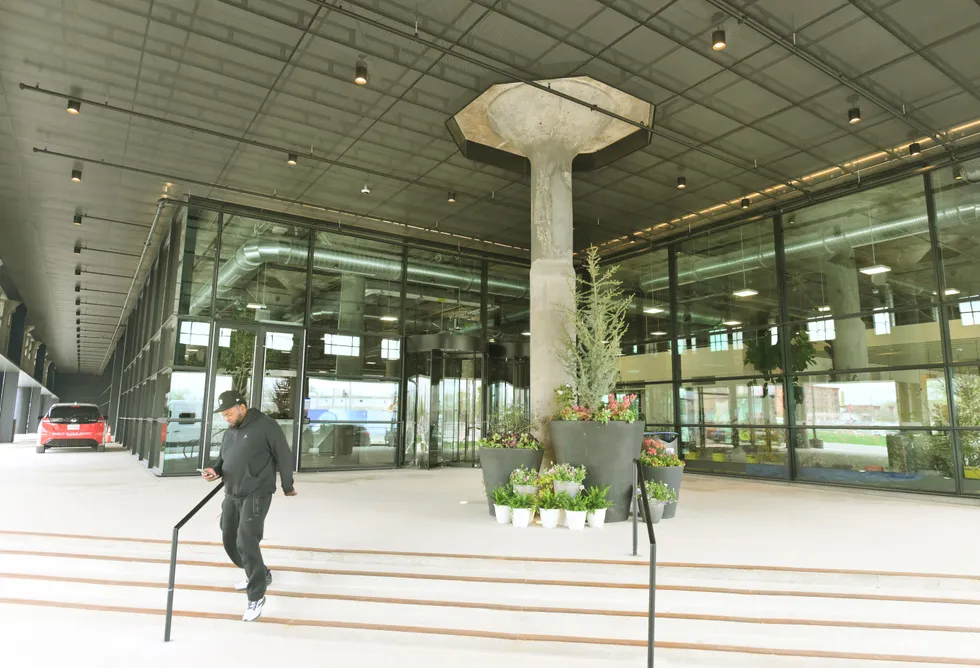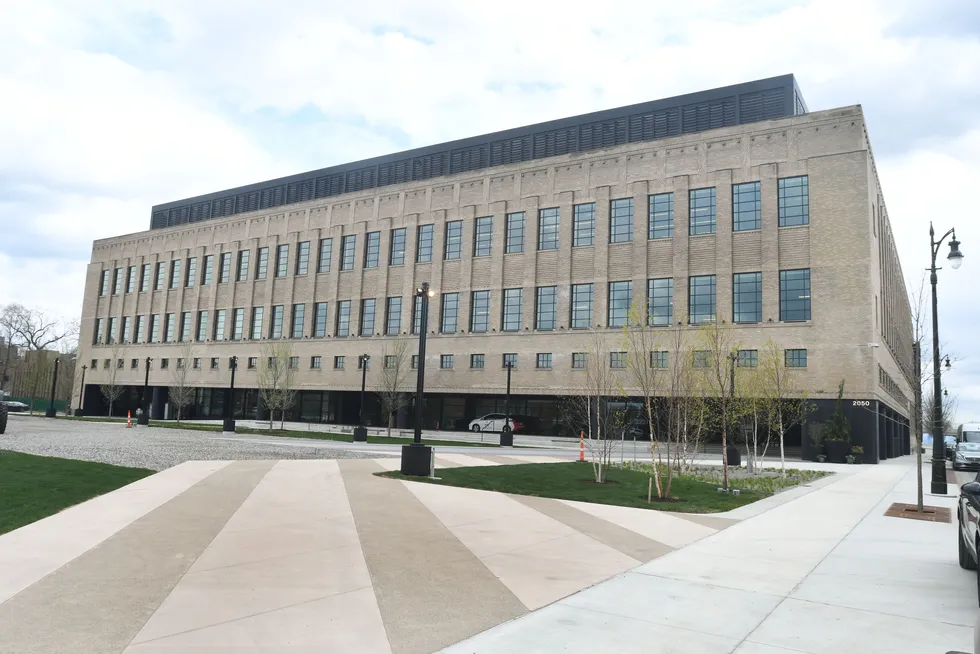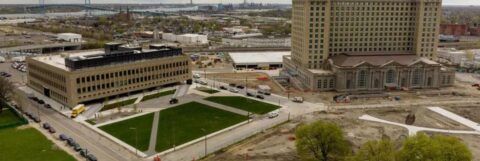The Detroit News
April 25, 2023
Jordyn Grzelewski and Candice Williams
Detroit — Bill Ford Jr. sees Michigan Central — the 30-acre, nearly $1 billion campus Ford Motor Co. is developing in the city’s Corktown neighborhood — playing a key role in realizing his vision for the future of mobility.
Work is already underway at the Book Depository building, the official opening of which will be celebrated Tuesday — a milestone in the redevelopment journey that began in 2018 when Ford bought Michigan Central and began a years-long process of revitalizing the iconic landmark after three decades of neglect.
The grand opening is the first “real tangible evidence of what I had hoped for five years ago,” Bill Ford, executive chairman of the Dearborn automaker, told The Detroit News. “It’s coming to life now. It’s doing exactly what I hoped it would, which is bringing entrepreneurs from outside our region, talent from outside our region and, ultimately, it will be a platform for certainly Ford employees, but many others too, to collaborate on inventing the future.”

Work finishes up on a walkway from Behind the Book Depository building to Bagley Street in Detroit on Monday. Daniel Mears, The Detroit News
That vision is more than a decade old, greeted with more than a little skepticism by industry rivals. Standing on stage at a TED conference in California in 2011, Bill Ford articulated a vision for how mobility would need to evolve in the coming decades to solve what he saw as a looming problem.
Population growth would fuel demand for vehicles, he explained, putting even more cars and trucks on the road. That may seem like an appealing scenario for the chairman of a company that sells cars, trucks and SUVs around the world, but Bill Ford saw it at odds with his environmentalist principles — and one that would create massive traffic gridlock, endangering people’s freedom of movement.
“The mobility model that we have today, simply will not work tomorrow,” he said at the time. The solution was not just smarter, zero-emissions cars, but smart roads, smart parking and smart public transportation.
Launch Five Years in the Making
The deal for Ford to buy from the Moroun family the long-vacant Michigan Central Depot, a landmark that dates to the early days of World War I, closed in 2018. Vacant, it loomed over the city’s near west side, a symbol of Detroit’s long, slow decline. In the nearby Book Depository, a dead body was found frozen in ice at the bottom of a cargo elevator shaft — unreported until the winter of 2009.
A lot has changed in the intervening 14 years, with this patch of Corktown poised to welcome a next-generation technology campus and the people who will make it hum. Ford has said it expects to eventually have as many as 5,000 employees — about half of them from Ford, the other half from other companies — based on the campus.
“It’s where the future will be built,” Bill Ford said in an interview with The News at the time. “We’re going to have a corridor of mobility. The train station will be a spectacular building. It will be open to the public. One thing I don’t want is to have a big corporate presence, to be seen as a corporate takeover of Corktown.”
Mayor Mike Duggan in 2018 touted Ford’s plans as “the biggest thing to happen in Detroit since Dan Gilbert brought Quicken down.” The former train depot itself is the centerpiece of Ford’s 30-acre, nearly $1 billion Corktown development.
In all, the project spans 1.2 million square feet of commercial space, including office space and outdoor areas that will be open to the public. The train station — which will have public components such as retail shops and restaurants — had been slated to open this year, but that timeline has now gotten pushed back to next year.
The grand opening Tuesday of the restored Book Depository, which will serve as the Detroit headquarters for Newlab, marks the official launch of Michigan Central.

The entranceway on the northwest side of the Book Depository Building. Daniel Mears, The Detroit News
Reviving an Iconic Building
Once an overlooked building in the shadow of Michigan Central Station, the Book Depository now visually pops out of the landscape.
Much of the exterior of the Book Depository on 15th Street remains structurally the same but features new windows and a large overhung porch along the north-facing side of the building. The porch has tall windows that let in light and show off the landscaped frontage.
Large revolving doors bring workers and visitors into the space. Among the first spaces one sees are a reception desk and a café area, The News saw during a tour of the building. But the paper was not allowed to shoot pictures inside the building.
“The idea is for this to support the community in the building,” said Josh Sirefman, Michigan Central’s CEO. “And when we get to the station, which will come online later, we’ll be very, very public-focused. For now, we want to make sure we’re supporting the community that’s going to be working here.”
Opened in 1936, the Albert Kahn-designed building was originally a United States Postal Service branch to handle mail that came in by rail at Michigan Central Station next door. A tunnel in the basement still connects the two buildings.
When the post office relocated in 1961, the Detroit Public Schools acquired the building to serve as the district’s warehouse to store textbooks and school supplies. After a fire on March 4, 1987, the building sat empty for 35 years.
The Moroun family purchased the Book Depository and the train station, and both sat empty for years, falling into further ruin. Ford purchased both buildings in 2018.
Sirefman said that there was a six-foot-high pile of books inside the Book Depository. Trees were also growing inside the building. Now trees and other plants are planted on purpose in the common spaces, a design feature that brings in elements of the outside.
Much of the original interior is gone, but there are numerous large support columns left exposed throughout the space, reminding the building’s occupants that the space had a life before its present use.
“The bones of the building are really wonderful,” Sirefman said. “The Albert Kahn columns are beautiful.”
In its heyday, the center of the building had four small skylights — one for each floor — that had collapsed. As part of the new design, the building features one large skylight that brings light in all the way down to the first floor.
The design, Sirefman said, “is a very powerful move that sort of sets the tone. In my own way, it to me feels almost cathedral-like. This is like a cathedral of innovation of the work that’s happening.”
While some of the companies have their own private offices, the building has numerous collaborative spaces and flexible areas for work and to host events. Among the spaces that the startups can share include the robotics equipment and woodworking areas.
Some of the companies started to move in at the end of 2022. They include the likes of Airspace Link, a drone management platform; Cavnue, a company working on advanced roadways for automated vehicles; and JustAir, a Detroit-based startup developing air pollution monitoring solutions, according to a news release.
The building has 2,000 square feet of exhibition space, a 200-seat event space and an 11,000 square-foot robotics and prototyping facility. In all, it spans 270,000 square feet.
“It’s at its highest and best use as this sort of engine of innovation,” Sirefman said. “The beauty of that is also it’s not just the work happening here, but it’s the opportunity that creates for skills teaching. This is the future that is happening here. And the opportunities that it creates I think are so powerful. … I can’t imagine what else would have given it its better next life.”

The Book Depository will serve as Newlab Detroit’s headquarters. Daniel Mears, The Detroit News
Mobility future
The facility serves as the Detroit headquarters for Newlab, the organization’s first location outside of New York City. Here, Newlab will be tasked with establishing a high-tech startup ecosystem at Michigan Central.
Already, Newlab Detroit counts more than 150 members from more than 25 companies. About half of the companies are from the Detroit area, with the rest hailing from other parts of the country and world. The companies already located there have raised more than $500 million in venture capital funding
The expectation is that some of the startups working out of the Book Depository will eventually plant permanent roots and expand in the Detroit area. Some have already moved their operations here.
“Getting Newlab was hugely important,” Bill Ford said. “They are an incredibly successful makerspace provider that has a lot of the machinery and infrastructure so that companies can actually prototype and, importantly, work together on projects. And they’re highly sought-after by many, many other cities who would like them to set up shop there.”
The transformation of Michigan Central is, in some ways, reflective of a broader transformation that’s sweeping the automotive industry and Ford itself. Top Blue Oval leaders have said the changes are akin to “refounding” the nearly 120-year-old company.
Next week, Ford, for the first time, will report its financial results to reflect the division of the company into three separate business units centered, respectively, on EVs and software; internal combustion engine and hybrid vehicles; and commercial vehicles, a restructuring aimed at supporting its $50 billion electrification plan.
Bill Ford sees Michigan Central playing an important role in that transition: helping the automaker — and the state as a whole — attract new talent.
“It’s certainly occurred to me that if we’re in a war for talent, particularly with a lot of the tech companies, some of them have wonderful campuses where it’s sunny and warm. Well, we can’t replicate that. But what we can do is provide a workplace environment, like Corktown, which they can’t replicate,” he said. “It’ll be beautiful. It’ll be collaborative. And it’ll be part of a thriving downtown area.”
The coronavirus pandemic and subsequent changes in the way we work makes such efforts all the more relevant, he argued: “I think what people don’t want to do is go to work in nondescript, unexciting buildings. So whether it’s our campus transformation in Dearborn, or our Corktown endeavor, I think it’s actually in some ways even more important now that we provide those really beautiful, exciting and collaborative workspaces, post-COVID.”
Reflecting back more than a decade ago when he spelled out his vision for the future of mobility, he recalls there being skeptics. Others, he said, questioned whether Ford was moving quickly enough on developments such as self-driving vehicles — technology that has advanced in recent years but which is still a long way from becoming a mainstream feature in passenger vehicles.
“I knew that those timelines that others were laying out were unrealistic,” Bill Ford said. “So here we are today, 2023, and those concepts are being worked on — by us and by others. And slowly but surely, they will come to fruition. And it’s my hope and desire that a lot of that activity takes place in Corktown.”

